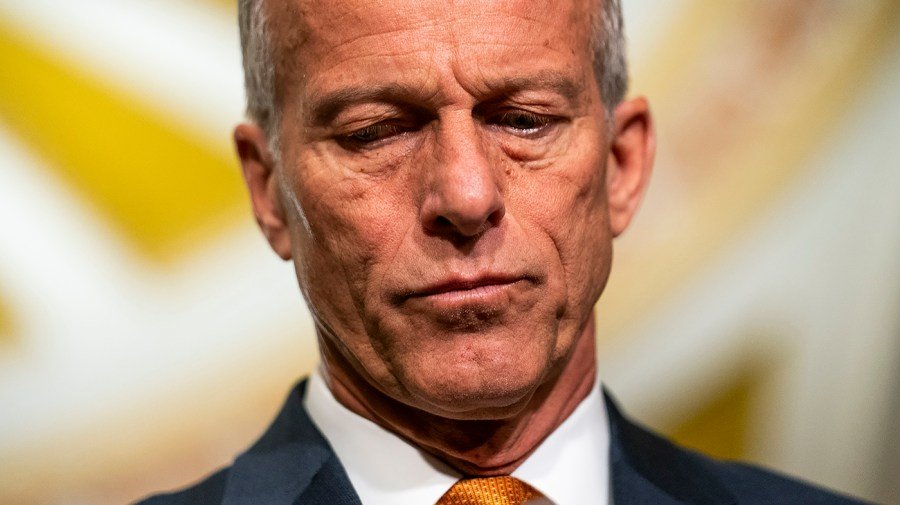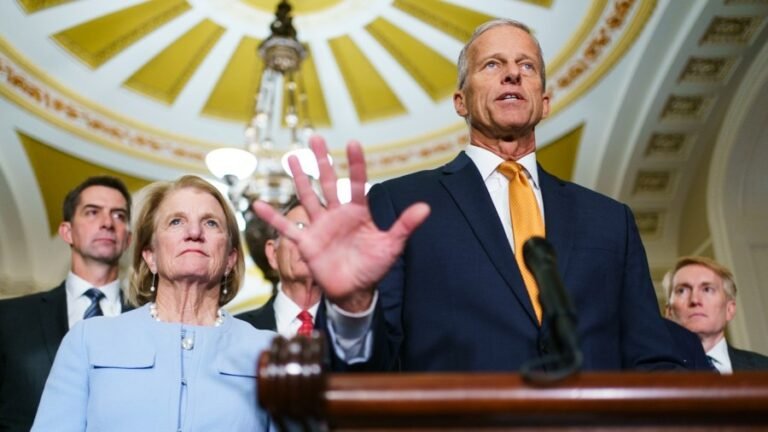
Cracks are forming in the Senate GOP conference over whether benefits under the Supplemental Nutrition Assistance Program (SNAP) should be allowed to lapse this weekend.
Republicans have been unified throughout the shutdown in voting 13 times for a House-passed bill to reopen the government, but there are divisions on the SNAP issue, which could leave millions without crucial benefits.
Expiration of food assistance funding is expected to impact nearly 42 million Americans across the country, including millions of people in Republican-represented states.
“I think we got to find some way to get help to 40 million people. This Saturday is going to be bad. It’s going to be really bad,” said Sen. Josh Hawley (R-Mo.), referring to the expiration of SNAP funding this weekend.
Hawley has introduced a bill, the Keep SNAP Funded Act, to provide funding to provide uninterrupted SNAP benefits, retroactive to the start of the shutdown. The legislation already has 14 Republican co-sponsors — a healthy fraction of the Senate GOP conference.
But a number of Republicans oppose extending SNAP during a shutdown they blame on Democrats. They think Democrats, in blocking the House GOP funding bill, are the ones to blame for any lapse in SNAP.
Vice President Vance told Republican senators at a meeting Tuesday that they should avoid voting on “rifle-shot” bills to fund different parts of the federal government, such as SNAP, during the shutdown.
Republicans want the pressure to be on Democrats to end the shutdown. Democrats say they blocked the GOP legislation because they want subsidies under the Affordable Care Act that are set to expire at year’s end to be extended.
Sen. Lisa Murkowski (R-Alaska) says she wants to keep SNAP benefits flowing during the shutdown, even though the looming lapse in food assistance funding is putting tremendous pressure on Senate Democrats to vote for a “clean” continuing resolution to reopen government.
“I’d like to figure out a way to make sure SNAP benefits continue uninterrupted,” she told The Hill.
Murkowski said the expiration of SNAP benefits will hit Alaska Native communities especially hard.
“In many of these smaller villages, the one village store, 60 percent of the people who utilize the store are SNAP beneficiaries. And so the impact that we’re seeing on Native people around the country when you have a shutdown is something that’s not negligible,” she explained.
An estimated 1 million Native American and Alaska Native people are projected to feel an impact if the federal food assistance funding lapses on Nov. 1.
Sen. Susan Collins (R-Maine), a co-sponsor of Hawley’s bill to keep SNAP funded, questioned the Trump administration’s legal interpretation that it does not have the authority to spend $5 billion in the SNAP contingency pool, which Congress created to keep the low-income nutrition program funded in case of emergency.
“It is a novel interpretation for the department to claim that it cannot use that $5 billion in contingency money to help with SNAP benefits,” she said, referring to a memo circulated by the U.S. Department of Agriculture (USDA).
“I don’t think this was a USDA opinion. I really think it was imposed by OMB and we’ve been having discussions with OMB’s attorneys,” she said, referring to the Office of Management Budget, which is led by Russell Vought.
Collins told The Hill that she wants to vote on Hawley’s bill to fund SNAP benefits during the shutdown.
Other Republicans who have sponsored Hawley’s bill are Sens. James Lankford (Okla.), Marsha Blackburn (Tenn.), Bernie Moreno (Ohio), Kevin Cramer (N.D.), Bill Cassidy (La.), Katie Britt (Ala.), John Cornyn (Texas), Jon Husted (Ohio), Dan Sullivan (Alaska), Roger Marshall (Kan.), Cynthia Lummis (Wyo.) and Shelley Moore Capito (W.Va.).
Senate Majority Leader John Thune (R-S.D.) initially was open to the idea of voting on rifle-shot bills to fund distinct parts of the government and ease the pain of the shutdown on millions of Americans.
He scheduled a vote last week on a bill to pay active-duty military service members, air traffic controllers, Immigration and Customs Enforcement agents and Transportation Security Administration employees, for example. Democrats blocked that bill in a 54-45 vote, though three Democrats — Sens. John Fetterman (Pa.), Raphael Warnock (Ga.) and Jon Ossoff (Ga.) — supported it.
Since then, Thune has turned against the idea of voting on bills to open up different parts of the government or fund key priorities during the broader shutdown.
Thune on Thursday poured cold water on the idea of voting next week to keep SNAP benefits funded.
“I think the vote needs to be on opening the government,” he said Thursday when asked whether he would rule out a vote on Hawley’s SNAP bill.
Senate Republican sources say that Thune changed his view after it became increasingly clear that the White House and members of his own conference didn’t want to ease the political pressure on Democrats to end the shutdown.
Vance told Republican senators at the weekly Senate Republican policy conference lunch that they should stay away from the rifle-shot bills to fund SNAP and other priorities.
One argument he made is that if any of those bills pass, it would put pressure on Speaker Mike Johnson (R-La.) to reconvene the House in Washington to take up Senate-passed legislation, which would undermine the Republican strategy of isolating Senate Democrats, according to GOP senators who participated in the meeting.
Thune had already backed away from scheduling a vote on funding SNAP benefits during the shutdown when his leadership team met in his Capitol office on Monday.
“We’ll have a conversation with our members about what steps they want to take moving forward but my view is what it has been from the very beginning and that is, to pay SNAP recipients, open the government. It’s not complicated,” he said.
Other Republican senators are backing Thune and the White House’s strategy by warning that passing legislation to fund SNAP benefits next week will likely make it easier for Democrats politically to let the shutdown drag on.
“It lets some air out of the bubble too much,” said one Republican senator, who requested anonymity to discuss internal strategy. “Maximum pressure to reopen the government is what I think is the most effective. We’re still on our position of ‘open the government, it’s easy.’”
But the GOP senator acknowledged, “It’s really sad that you’re leveraging young mothers who can’t feed their children.”
Sen. Thom Tillis (R-N.C.) said the Senate should pass appropriations bills to fund the Department of Agriculture though fiscal 2026 instead of a stopgap measure to fund SNAP.
“We’ve got bills passed out of committee that address this. Why would we start with some sort of stopgap? I understand what Josh is doing but we have appropriations bills that have reported out of committee on a bipartisan basis that we can work on that would not only address [SNAP] but take this out of the scope of the next” continuing resolution (CR), he said.
“I think the better strategy is to say, ‘Get the CR done,’” he added, referring to the House-passed continuing resolution to reopen the government.
Thune on Wednesday objected to a request by Democratic Sen. Ben Ray Luján (N.M.) to pass a Democratic bill to fund SNAP and the Supplemental Nutrition Program for Women, Infants and Children by unanimous consent.
The GOP leader accused Democrats in a fiery floor speech of playing political games.
“We are 29 days into a Democrat shutdown and the senator from New Mexico is absolutely right. SNAP recipients shouldn’t go without food. People should be getting paid in this country and we’ve tried to do that 13 times and you’ve voted no 13 times. This is not a political game. This is real people’s lives that we’re talking about,” Thune said, his voice rising to an angry shout on the Senate floor.
Thune has scheduled 13 votes on a clean continuing resolution to fund the government through Nov. 21, and Democrats have blocked it every time, arguing it fails to address rising health care costs.


